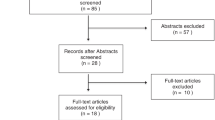Abstract
Objective
Little is known about the lived experiences of patients with metastatic melanoma undergoing checkpoint inhibitor treatment. We conducted a feasibility study of a supportive care intervention for melanoma patients being treated with pembrolizumab. Here, we report a secondary objective of the study, which was to explore the lived experience of being on pembrolizumab treatment for advanced melanoma.
Methods
Twenty-eight participants with metastatic melanoma were recruited across two cohorts, all receiving 3-weekly immunotherapy treatment. Semi-structured interviews were conducted with 26 participants once at 9 weeks. Thematic analysis using interpretative phenomenological analysis (IPA) was performed with multiple iterations of data review to achieve consensus.
Results
Three overarching themes were identified; here, we report the first and most dominant theme: how metastatic melanoma patients live within uncertain spaces. Although immunotherapy increases overall survival, metastatic melanoma patients live within an uncertain spectrum. They confront uncertainty related to immunotherapy treatment, their disease trajectory, family relationships, and decision-making. Melanoma patients attempt to normalize their lives, engaging in their usual activities. Uncertainty increases prior to active treatment and intensifies during investigation phases.
Conclusions
Despite progress in melanoma patient treatment and outcomes, these patients face sustained uncertainty about their disease trajectory.

Similar content being viewed by others
References
Robert C, Schachter J, Long G, Arance A, Grob JJ, Mortier L, Daud A, Carlino MS, McNeil C, Lotem M, Larkin J, Lorigan P, Neyns B, Blank CU, Hamid O, Mateus C, Shapira-Frommer R, Kosh M, Zhou H, Ibrahim N, Ebbinghaus S, Ribas A, KEYNOTE-006 investigators (2015) Pembrolizumab versus ipilimumab in advanced melanoma. N Engl J Med 372(26):2521–2532
Larkin J, Minor D, D’Angelo S et al (2017) Overall survival in patients with advanced melanoma who received nivolumab versus investigator’s choice chemotherapy in checkMate 037: a randomized, controlled, open-label phase III trial. J Clin Oncol. https://doi.org/10.1200/JCO2016.71.8023
Schadendorf D, Hodi FS, Robert C, Weber JS, Margolin K, Hamid O, Patt D, Chen TT, Berman DM, Wolchok JD (2015) Pooled analysis of long-term survival data from phase II and phase III trials of ipilimumab in unresectable or metastatic melanoma. J Clin Oncol 33(17):1889–U1848
Curl PK (2015) Navigating uncertainty: a valuable cost-effectiveness analysis in the rapidly changing field of metastatic melanoma treatment. Br J Dermatol 173(6):1365–1366
Hope-Stone LB, Stephen L, Heimann H, Damato B, Salmon P (2015) How do patients with uveal melanoma experience and manage uncertainty? A qualitative study. Psycho-Oncology 24(11):1485–1491
Karlsson M, Friberg F, Wallengren C, Ohlen J (2014) Meanings of existential uncertainty and certainty for people diagnosed with cancer and receiving palliative treatment: a life-world phenomenological study. BMC Palliative Care 13(1):28–28
Richardson A, Wagland R, Foster R, Symons J, Davis C, Boyland L, Foster C, Addington-Hall J (2015) Uncertainty and anxiety in the cancer of unknown primary patient journey: a multiperspective qualitative study. BMJ Support Palliat Care 5(4):366–372
Lobb E, Lacey J, Kearsley J, Liauw W, White L, Hosie A (2015) Living with advanced cancer and an uncertain disease trajectory: an emerging patient population in palliative care? BMJ Support Palliat Care. 5(4):352–357
Lacey J, Lomax A, Marthick M et al (2017) A supportive care intervention for people with metastatic melanoma treated with immunotherapy: a pilot study assessing feasibility and perceived benefit. Asia-Pac J Clin Oncol 13:147–148
Association WM (2013) World Medical Association Declaration of Helsinki: ethical principles for medical research involving human subjects. JAMA 310(20):2191–2194
Smith JA, Flowers P, Larkin M (2009) Interpretative phenomenological analysis: theory, method and research. Sage Publications Ltd, London
Balmer C, Griffiths F, Dunn J (2015) A ‘new normal’: exploring the disruption of a poor prognostic cancer diagnosis using interviews and participant-produced photographs. Health 19(5):451–472
Mendes A (2015) Helping people living with cancer adjust to their ‘new normal’. Br J Community Nurs 20(8):411–411
Beach PR. Surviving after cancer: living the new normal. Vol 38. Pittsburgh: Oncology Nursing Soc; 2011:599–599
Dean M (2016) “It’s not if I get cancer, it’s when I get cancer”: BRCA-positive patients’ (un)certain health experiences regarding hereditary breast and ovarian cancer risk. Soc Sci Med 163:21–27
Drageset SL, Christine T, Giske T, Underlid K (2016) Women’s experiences of social support during the first year following primary breast cancer surgery. Scand J Caring Sci 30(2):340–348
Inan FŞG, Partlak N, Üstün B (2016) Experiences of newly diagnosed breast cancer patients in Turkey. J Transcult Nurs 27(3):262–269
Cayless SF, Liz, Illingworth N, Hubbard G, Kearney N (2010) Men with prostate cancer over the first year of illness: their experiences as biographical disruption. Support Care Cancer 18(1):11–19
Simard SS, Josée, Ivers H (2010) Fear of cancer recurrence: specific profiles and nature of intrusive thoughts. J Cancer Surviv 4(4):361–371
Etkind SN, Bristowe K, Bailey K, Selman LE, Murtagh FEM (2017) How does uncertainty shape patient experience in advanced illness? A secondary analysis of qualitative data. Palliat Med 31(2):171–180
McLoone J, Watts K, Menzies S, Meiser B, Butow P, Kasparian N (2012) When the risks are high: psychological adjustment among melanoma survivors at high risk of developing new primary disease. Qual Health Res 22(8):1102–1113
Lebel S, Ozakinci G, Humphris G, Mutsaers B, Thewes B, Prins J, Dinkel A, Butow P (2016) From normal response to clinical problem: definition and clinical features of fear of cancer recurrence. Support Care Cancer 24(8):3265–3268
Simonelli LES, Scott D, Duffy NM (2016) Fear of cancer recurrence: a theoretical review and its relevance for clinical presentation and management: fear of recurrence. Psycho-Oncology
Mutsaers B, Jones G, Rutkowski N, Tomei C, Leclair S, Caroline, Petricone-Westwood D, Simard S, Lebel S (2016) When fear of cancer recurrence becomes a clinical issue: a qualitative analysis of features associated with clinical fear of cancer recurrence. Support Care Cancer 24(10):4207–4218
Grossmann KF, Margolin K (2015) Long-term survival as a treatment benchmark in melanoma: latest results and clinical implications, vol 7. SAGE Publications, London, pp 181–191
Ascierto PA, Long GV (2016) Progression-free survival landmark analysis: a critical endpoint in melanoma clinical trials. Lancet Oncol 17(8):1037–1039
Hajdarevic S, Rasmussen BH, Hornsten A (2014) You never know when your last day will come and your trip will be over--existential expressions from a melanoma diagnosis. Eur J Oncol Nurs 18(4):355–361
Beesley VL, Smithers BM, Khosrotehrani K, Khatun M, O’Rourke P, Hughes MCB, Malt MK, Zonta MJ, Bayley GJ, Barbour AP, Brown LJ, D’Arcy J, Allan CP, Green AC (2015) Supportive care needs, anxiety, depression and quality of life amongst newly diagnosed patients with localised invasive cutaneous melanoma in Queensland, Australia. Psycho-Oncology 24(7):763–770
Trusson D, Pilnick A, Roy S (2016) A new normal?: Women’s experiences of biographical disruption and liminality following treatment for early stage breast cancer. Soc Sci Med 151:121–129
Mishel MH (1988) Uncertainty in illness. Image 20(4):225–232
Blows E, Seymour J, Cox K (2013) Liminality as a framework for understanding experiences of long-term cancer survivorship. Psycho-Oncology 22:2155–2164
Little M, Jordens C, Paul K, Montgomery K, Philipson B (1998) Liminality: a major category of the experience of cancer illness. Soc Sci Med 47(10):1485–1494
Gennep AV (1960) The rites of passage. Routledge & Kegan Paul, London
Turner VW (1967) The forest of symbols: aspects of Ndembu ritual. Cornell University Press, Ithaca
Turner VW (1969) The ritual process: structure and anti-structure. Vol 01/1969. MLA International Bibliography
Koutri I, Avdi E (2016) The suspended self: liminality in breast cancer narratives and implications for counselling. 5(1):78–96
Crouch M, McKenzie H (2006) The logic of small samples in interview-based qualitative research. Soc Sci Inf 45(4):483–499
Acknowledgments
The authors would like to thank Corrinne Renton, Research Officer, Centre for Medical Psychology and Evidence-Based Decision-Making, Sydney Medical School, University of Sydney, for database design, management, and technical support; Theresa Nielsen for assistance with participant recruitment and coordination; Alex Pereira and Charlotte Davies for assistance with data entry; and Alison Sibley for administrative support and the supportive care and integrative oncology team at Chris O’Brien Lifehouse for clinical input.
Data ownership
The data generated as part of this study remains the property of the investigators. It is available for inspection on request.
Funding
This study was funded through an educational and research grant from MSD, administered through Chris O’Brien Lifehouse. Anna Lomax was supported by the Simon Kerr Fellowship.
Author information
Authors and Affiliations
Corresponding author
Ethics declarations
Ethical approval was granted by Sydney Local Health District – Concord zone Human Research Ethics Committee (HREC/15/CRGH/265) in accordance with the Declaration of Helsinki
Conflict of interest
Catriona McNeil received travel, conference, and accommodation support from MSD; has sat on MSD advisory boards; and has given talks for MSD and BMS (honoraria to Chris O’Brien Lifehouse). Steven Kao received honoraria paid to his institution from Boeringher, Astrazeneca, Roche, Pfizer, BMS, and MSD. Steven Kao has had travel costs paid for by BMS, Roche, and AstraZeneca. Haryana Dhillon has received honoraria paid to her institution from MSD. Judith Lacey has received honoraria paid to her institution from TEVA and MSD.
Rights and permissions
About this article
Cite this article
Levy, D., Dhillon, H.M., Lomax, A. et al. Certainty within uncertainty: a qualitative study of the experience of metastatic melanoma patients undergoing pembrolizumab immunotherapy. Support Care Cancer 27, 1845–1852 (2019). https://doi.org/10.1007/s00520-018-4443-3
Received:
Accepted:
Published:
Issue Date:
DOI: https://doi.org/10.1007/s00520-018-4443-3




